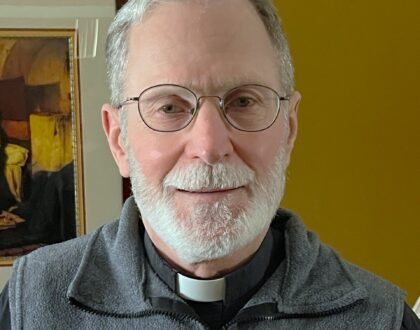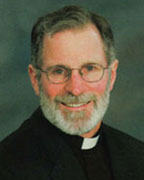Homily, July 9, 2023

From The Pastor
Faith is most itself when it is tested. It is the challenges, the unexpected losses, and changes in life that can either draw us closer to the Lord or incline us to a loss of hope. The readings this week remind us again of the unending providence of God that calls us to persevere in faith with a lively hope.
‘Rejoice heartily, O daughter Zion, shout for joy, O daughter Jerusalem.’ This acclamation of hope comes from the prophet Zephaniah after the Israelites have returned from exile to their destroyed city. It was a time of rebuilding and establishing a working society centered around the Temple. It was a mighty task and the words of hope from Zephaniah were effective and appreciated. This is more than a pep talk of social patriotism to inspire loyalty. It is more than a worldly rah-rah to encourage tired workers on a difficult project. It comes as a Divine word from God who is fulfilling his plan to restore the people of Israel after infidelity and exile.
The theme is strengthened in the praise of Jesus to the Father for his goodness and love to those who seek him. “I give you praise, Father, Lord of heaven and earth, for although you have hidden these things from the wise and the learned, you have revealed them to little ones.” What are ‘these things’ Jesus refers to? To the little ones, trusting faith is revealed to those dependent on God with confident hope that God will provide. This openness to faith and willing dependence on God by the vulnerable is contrasted by the learned and the wealthy who fail to realize that they too have equal need for God. The proud and the strong can be ignorant and blind to their need for God in the illusion of worldly power, wealth, or control. In the end, regardless of our state or stature in life, we are dependent on God for life and the promise of redemption.
Why is Jesus so pleased and inspired to offer this acclamation of praise to the goodness of our Divine Father? Through the Incarnation, Jesus entered a wounded and broken world. He did not come in a time of national peace, economic prosperity, or strong social justice. Quite the opposite. Divine providence brought Jesus to a small nation of little stature that was regularly battered and bruised by larger more powerful nations. Jesus was born into a nation racked with social and political unrest where the wealth and power was controlled by two or three percent of the people. The core religion of the Temple was the center of commerce that left people diminished by fees for sacrifice that rendered them sinners and unacceptable to God. It was a time of oppression and suffering for most people. The praise of Jesus reflects the hope and joy God gives to those dependent on his provident care. Jesus reveals the truth of God as he invites simple believers weighed down with life to accept the yoke of faith that will give them rest. Jesus favors those in such need who place their trust in God. This does not mean all of life’s troubles are resolved, but that the heart and soul can find a sustaining peace in the confident hope of Divine providence.
What is the ground and foundation of this hope? It is our justification given by God in the dying and rising of Jesus. In the second reading, we continue with St. Paul’s teaching on justification by faith in the Lord Jesus. Last week, we learned of God’s initiative and mercy who came to us while we were lost in sin. While we were still enemies of God, wayward and unaware, God came to our aid.
How are we justified? It is by God’s gift. It is not our doing. It is God’s action in the coming of Christ to redeem humanity and all creation. St. Paul makes it clear that it is not something we do. It is God’s unsolicited gift. We cannot earn it and we cannot pay for it. That is why it is called justification. It is God doing for us what we could never do for ourselves. It is this reality that makes known the nature of the Divine as unlimited, unmerited, unconditional self-surrender.
What is surrendered? It is the love of God given in the dying and rising of the Lord Jesus. You know the story. Jesus willingly becomes the worthy sacrifice that defeats the lie of evil and the disorder of sin. How? In the power of Divine love revealed through his fully human person, Jesus willingly dies on the Cross for us. In love, with free and willing surrender, the death of Jesus proves stronger than sin and death. Sin and evil are defeated by the surpassing power of Divine love confirmed in the Resurrection.
When we choose Christ with confident trust in this love we are justified by faith. We no longer live in the flesh, the ways of the world, now we live in the Spirit. The Spirit of Christ lives in us to transform us day by day from the old self of sin to the new self of Christ within. We could never do this alone. Only the power of the Son of God in his dying and rising, who now lives in us through the Holy Spirit can make this possible. This is what evokes the joyful praise of Jesus to the Father. It is the simple believer who surrenders to the dependence of God who finds hopeful peace. The proud and the wealthy holding power and influence take longer to realize this truth. A day will come when all will be made clear. Those who live with faith and confidence in God will come to know the fullness of his peace here and hereafter. Praise be God.
Father John Esper
Recent Sermons

Homily, March 30, 2025
March 27, 2025

Homily, March 23, 2025
March 20, 2025

Homily, March 16, 2025
March 11, 2025

